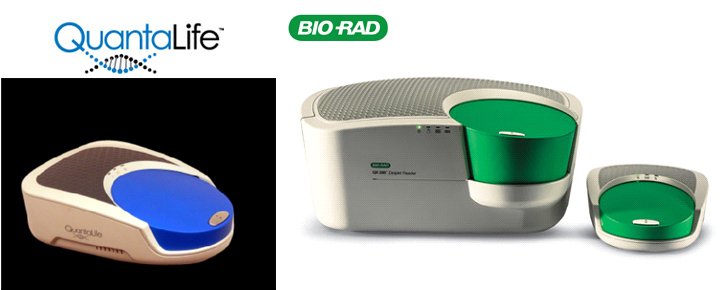Enabling Faster Early Detection of Pathogens
Whether in the realm of anti-bioterrorism or cancer treatment, early detection can be the difference between life and death. Leveraging the unparalleled pathogen-detecting technology that shields Americans from the threat of bioterrorism, LLNL and Bio-Rad Laboratories, Inc. are in the business of transforming the world of genetic testing.
For years, life scientists used polymerase chain reaction (PCR) to assess the genetic composition of a specimen. However, conventional PCR approaches faced concerns of scale: the nanoscopic indicators that signal the early-onset of a disease could be missed within a traditional sample. Compounding this issue: without the ability to divide a sample into equivalent, smaller subsets, scientists needed to use statistical models to estimate—rather than quantify—the prevalence of any detected rare-event pathogens or genetic mutations.
Enter LLNL, whose work with anti-bioterror sensor systems primed the Lab to offer rare-event detectors to the world of early diagnostics. In 2008, award-winning LLNL biodefense scientist Bill Colston founded QuantaLife, Inc., a biotechnology firm that converted LLNL’s anti-bioterrorism detectors into genetic screening tools that used an oil-emulsion to anatomize a single sample into thousands of equivalent, nanoliter droplets. Each of these droplets could then be screened for the nucleic acid markers that would reveal pathogens or mutations, offering researchers a way to magnify any expressed genes within a sample. QuantaLife’s product, the Droplet Digital™ PCR (ddPCR™), allowed scientists to finally eliminate the noise that hindered accurate quantification.

Thanks to the success of the ddPCR™ system, the Personalized Medicine World Conference named QuantaLife, Inc. the “Most Promising Company” of 2010. The ddPCR™ also received Frost & Sullivan’s “2011 North American Personalized Medicine New Product Innovation Award.” Recognizing the value of this revolutionary product, Bio-Rad Laboratories, Inc., a manufacturer and distributor of life-sciences diagnostic tools, purchased QuantaLife and the rights to ddPCR™ in 2011. Bio-Rad enriched the ddPCR™ approach by developing the QX100 Droplet Digital PCR System, which features one device to generate the emulsified droplets and a second device to analyze the results of the PCR test. This paired-approach allows researchers to integrate their own procedures during diagnostics, thereby expanding the versatility of the system. The QX100 Droplet Digital PCR system would go on to win R&D Magazine’s distinguished “R&D 100 Award” in honor of the technology’s far-reaching impact.
Thanks to the Digital Droplet™ PCR technology initiated at LLNL, transformed by QuantaLife, Inc. and expanded by Bio-Rad Laboratories Inc., researchers may now delve deeper into a wide range of genetic mysteries, including sequential mutations, cancer progressions, and pathogen adaptations. What’s more, medical professionals use this tool to personalize their treatments according to the genetic needs of their patients. Such empowering technology will continue to transform medicine and promises to prompt innumerable discoveries within diagnostics and beyond.

